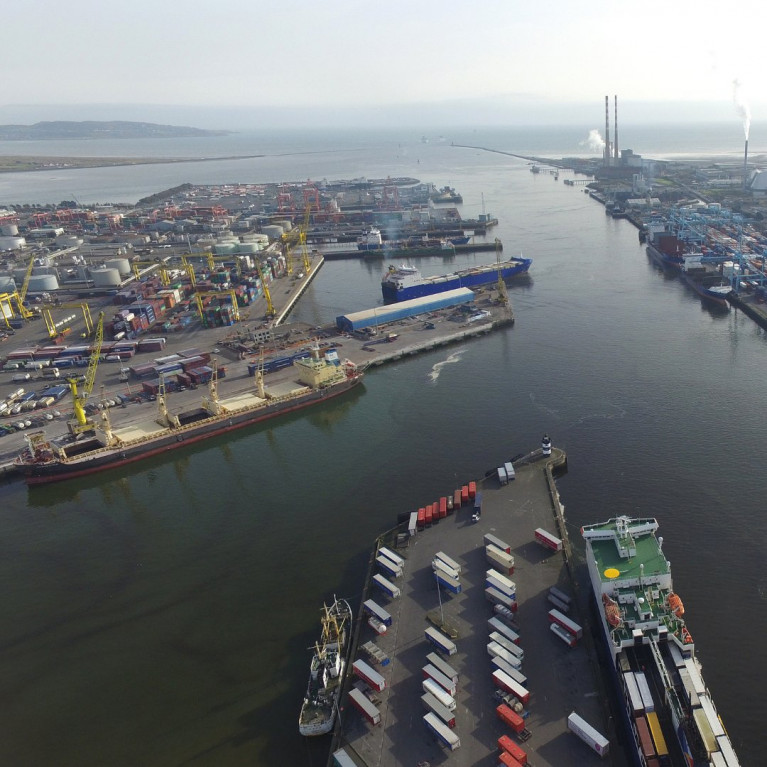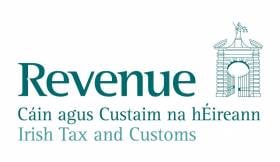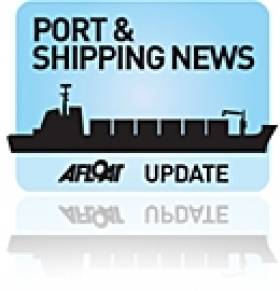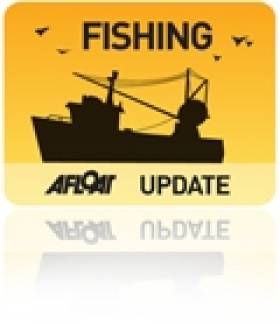Displaying items by tag: Revenue Commissioners
Patrols at sea by the Revenue Commissioners’ maritime unit are a key theme of a new documentary made by RTÉ Raidió na Gaeltachta (RnaG) on cocaine use on the west coast.
Customs officers with the Revenue Commissioners’ patrol vessel were interviewed during patrols off the Co Clare coast for the documentary, made by leading RnaG journalist Cóilín Ó Neachtain.
In the documentary, entitled Snaoisín Bán, Ó Neachtain investigates the problem of cocaine use in Conamara and wider Co Galway.
Garda figures indicate that there was an increase of more than 50% in the number of people caught in possession of cocaine in Conamara in 2022, compared to the previous year.
 The Customs Maritime Vessel approaches a ship Photo: RnaG
The Customs Maritime Vessel approaches a ship Photo: RnaG
In the programme, members of an Garda Síochána speak about their experience of this growing problem, and the work of the Customs and the Revenue Commissioners Maritime Unit to keep drugs out of the country is also documented.
Ó Neachtain also speaks to two healthcare professionals, addiction counsellor Joe Treacy and GP Michael Casey, about their experience of this issue and the very serious health implications. There is also a “damning assessment” of the services available for addicts in Co Galway.
One young man interviewed for the radio programme describes how his cocaine habit escalated from one line to a €500 a day habit.
It cost him his job, his relationship, and his health, before he finally got help. The programme profiles the services available in the Bushypark Addiction Treatment Centre in Ennis, Co Clare.
Snaoisín Bán airs today, Wednesday, February 8th, on RTÉ Raidió na Gaeltachta at 1405 hours.
According to Revenue, 84% of freight vehicle (ro-ro) movements into Ireland from Britain through the ports of Dublin and Rosslare since January 1 were "green routed", meaning they did not require any checks on arrival.
A further 12% were "orange routed" for a documentary or similar check, reports RTE News.
The remaining 4% were "red routed" for a physical examination or inspection of goods, although this does not always imply non-compliance.
In total, Revenue said there have been 186,500 vehicle movements since the formal departure of the UK from the EU took effect at the start of the year, exactly six months ago today.
"The significant and permanent change in trading arrangements with Great Britain since 1 January last represents the biggest challenge for trade and business in Ireland in almost 30 years, since the creation of the EU Single Market," said Gerry Harrahill, Revenue Commissioner and Director General of Customs at Revenue.
However, the volume of goods imported from the UK has fallen considerably this year compared to last year and pre-pandemic, down 31% in March and 20% in April, according to the most recent figures from the Central Statistics Office.
More here on this story.
Revenue Guidance For Compliance With Green Diesel Ban For Pleasure Craft To Come Before New Year
The Revenue Commissioners will prepare guidance material for their website and update relevant tax and duty manuals in advance of the upcoming ban on the use of green diesel for private pleasure craft, it is understood.
That’s according to the latest Marine Notice from the Department of Transport, Tourism and Sport which reminds boaters that the use of marked gas fuel as a propellant by private pleasure craft will be prohibited from 1 January 2020.
However, as reported earlier this week, oil suppliers at ports around Ireland’s coast have yet to be formally updated as to what changes are required under the new legislation. Afloat.ie has more on the story HERE.
Seized Cigarette Cargoship Detained in Dublin Port For Three Years to Be Finally Disposed
#SeizedShip – A Moldovan flagged cargoship seized with €14m worth of tobacco by the Revenue Commissioners three years ago still remains detained in Dublin Port but plans are in place to finally dispose the vessel.
The 667 tonnes Shingle had loaded 32m cigarettes and 4,000kg of water pipe tobacco in Slovenia and from there arrived to Drogheda Port in June 2014 via Lisbon, Portugal. At the time of the recovery it was the biggest seizure of cigarettes so far in Europe that year. The operation had targeted an international crime gang led by Irish and UK nationals based also in Europe.
Afloat can confirm the latest status of the seized cargoship following a response from the Revenue Commissioners which commented the ‘High Court last month made an Order for the forfeiture of the MV Shingle. There was no appeal within the specified period and the vessel can now be disposed of. Following consideration of disposal options, appropriate disposal arrangements will be made in due course’.
The customs seizure operation had involved not just the Revenue Commissioners but months of work and co-operation from law enforcement agencies in Solvenia and Portugal. This led to the Shingle boarded in the Irish Sea by Customs officers backed by the Gardaí.
The Shingle was escorted by Revenue Customs Cutters Suirbheir and sister Faire to Drogheda. Due to the sheer scale of the seizure for logistical reasons it was decided to transfer the 1982 built cargoship from the Louth port to the capital. Again this passage required the cutters to accompany the vessel.
Initially the Shingle in Dublin Port was allocated a berth within Alexandra Basin along Ocean Pier to where an intensive examination of the illegal contraband took place. Following the customs seizure, the Paris MoU, an international organisation whose mission is to eliminate the operation of sub-standard ships through Port State Control detained the cargoship.
The Shingle shifted berths to the North Wall Quay Extension. This is where for the last three years the small ship has occupied a prominent berth given its close proximity to passing commuters using the Tom Clarke (East-Link) toll bridge.
Ongoing Ferry Saga As Cargoship is Detained
Harbourmaster Capt. Brian Sheridan, confirmed yesterday evening that the Danish flagged vessel had been detained at lunchtime on the instructions of the admiralty marshal, a High Court judge, acting under maritime law. Until matters are resolved, a ship's keeper has been placed onboard by the Revenue Commissioners.
New Fisheries Protection Vessel for Northern Ireland
The FPV was built by AS Baltic Workboats in Estonia and the 25 knot plus craft has already entered on operational duties as part of the Joint Deployment Plan with the Irish Naval Service to underpin fishery protection arrangements.
Layout of the vessel superstructure consists of the wheelhouse for a crew of three and provisional space for two observers. At the aft end there is a wet laboratory for scientific and data collecting purposes. On the lower deck the vessel can accommodate seven crew members in three twin cabins and a single cabin for the captain. Other facilities are the mess, galley and WC.
An onboard RIB, powered by twin 60hp outboards is located aft in the stern-well. Also located at the stern is a two ton capacity movable hydraulic gantry and a one ton Guerra marine deck crane. To create more deck-space for scientific research operations, the stern-well can be covered over with boards, a similar design feature is found on the Revenue Commissioners two Finish built custom cutters RCC Suirbheir and RCC Faire.
In addition to fishery protection, the craft is designed for seabed mapping, survey equipment technology to inspect inshore mussel resources for the
aquaculture industry and to detect pollutants. The ability to conduct such functions will enable greater assistance and understanding of the marine environment for DARD's science partners at the Agri-Food and Biosciences Institute (AFBI).
The design of the Banrion Uladh is based on Baltic Workboats 24m Baltic 2400 class which has been operating for clients in Estonia, Latvia and Poland. In addition the same class is also to be used as a basis for boats which are under construction for the Swedish Coast Guard.
New Green Diesel Tax Rates for Boatowners
The Revenue Commissioners have published updated guidelines for the excise duty payable on green diesel used by private boatowners in Ireland.
The update accounts for the changes earlier this year to Mineral Oil Tax rate due to the imposition of the carbon charge, as well as the recent Budget increase.
The rate from 1 January to 30 April 2010 stands at €0.40182 per litre, from 1 May to 7 December 2010 at €0.36052 per litre - reflecting the new separate carbon tax - and from 8 to 31 December 2010 at €0.37704 per litre.
The new guide and tax return form can be downloaded as a PDF file HERE.
New series of 'Customs' on RTÉ One
The second series of 'Customs' returns to television screens next Wednesday (17 November) on RTÉ One at 8.30pm. The Revenue Commissioners customs cutter, RCC Faire, which officially entered service in October of last year, will feature in the new series.
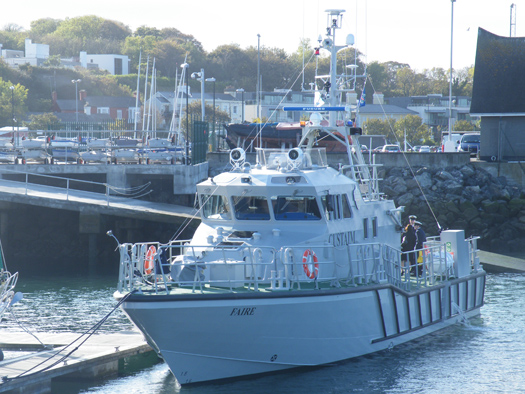
RCC Faire at Howth Harbour on the day of her naming ceremony on 16 October 2009. Photo: Jehan Ashmore / ShipSNAPS
To be broadcast in six-parts, the series will provide unprecedented access into the daily operations of the custom officers.'Customs' examines how the country is dealing with increasing levels of illegally imported materials and substances.
Custom officers found shipments of drugs in the strangest places: a doll's house, picture frames, the bottom of a massive cargo ship. In addition the seizure of contraband cigarettes, vehicles, large
quantities of money and the more bizarre discovery of a Colombian snake.
New series of 'Customs' on RTÉ One
To be broadcast in six-parts, the series will provide unprecedented access into the daily operations of the custom officers.'Customs' examines how the country is dealing with increasing levels of illegally imported materials and substances.
Custom officers found shipments of drugs in the strangest places: a doll's house,picture frames, the bottom of a massive cargo ship. In addition the seizure of contraband cigarettes, vehicles, large quantities of money and the more bizarre discovery of a Colombian snake.



























